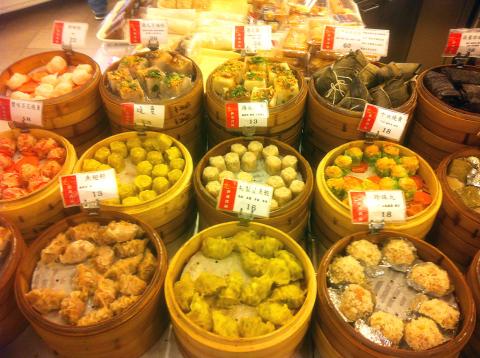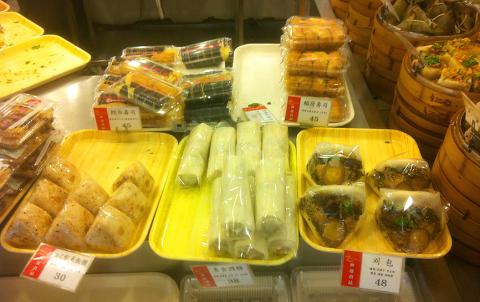There are few traditional bakeries in the city like Olympia (世運食品). The Ximending area shop, which has been in business since 1950, boasts on its Web site about its award-winning pineapple cakes and Japanese-style ham sandwiches.
Both are good and fairly unique for your run-of-the-mill Taiwanese bakery, but Tidbits holds a special appreciation for Olympia for its deli, which is stocked with sushi rolls, a wide variety of Taiwanese luwei (滷味, savory meats, vegetables or tofu braised in a soy sauce broth) and classic dim sum dishes.
The steamed dumplings are one of our personal favorites for a quick meal. There’s nearly a dozen to choose from — from the standard shrimp xiao-mai and fish dumplings to scallop and pork dumplings. The turnip cakes (luobogao, 蘿蔔糕) are also good and other traditional foods such as zongzi (粽子, glutinous rice wrapped in bamboo leaves) are also available. And if you miss the deep-fried eggrolls that are common in Chinese restaurants in the US and not so easy to find here, Olympia is your place. Prices range from NT$13 to NT$25 per piece, and you pick and choose whatever you want buffet-style.

Photo: David Chen, Taipei Times
Olympia Bakery is located near Zhongshan Hall (中山堂) on 103 Boai Rd, Taipei City (台北市博愛路103號), Tel: (02) 2331-0729

Photo: David Chen, Taipei Times

The canonical shot of an East Asian city is a night skyline studded with towering apartment and office buildings, bright with neon and plastic signage, a landscape of energy and modernity. Another classic image is the same city seen from above, in which identical apartment towers march across the city, spilling out over nearby geography, like stylized soldiers colonizing new territory in a board game. Densely populated dynamic conurbations of money, technological innovation and convenience, it is hard to see the cities of East Asia as what they truly are: necropolises. Why is this? The East Asian development model, with

June 16 to June 22 The following flyer appeared on the streets of Hsinchu on June 12, 1895: “Taipei has already fallen to the Japanese barbarians, who have brought great misery to our land and people. We heard that the Japanese occupiers will tax our gardens, our houses, our bodies, and even our chickens, dogs, cows and pigs. They wear their hair wild, carve their teeth, tattoo their foreheads, wear strange clothes and speak a strange language. How can we be ruled by such people?” Posted by civilian militia leader Wu Tang-hsing (吳湯興), it was a call to arms to retake

This is a deeply unsettling period in Taiwan. Uncertainties are everywhere while everyone waits for a small army of other shoes to drop on nearly every front. During challenging times, interesting political changes can happen, yet all three major political parties are beset with scandals, strife and self-inflicted wounds. As the ruling party, the Democratic Progressive Party (DPP) is held accountable for not only the challenges to the party, but also the nation. Taiwan is geopolitically and economically under threat. Domestically, the administration is under siege by the opposition-controlled legislature and growing discontent with what opponents characterize as arrogant, autocratic

When Lisa, 20, laces into her ultra-high heels for her shift at a strip club in Ukraine’s Kharkiv, she knows that aside from dancing, she will have to comfort traumatized soldiers. Since Russia’s 2022 invasion, exhausted troops are the main clientele of the Flash Dancers club in the center of the northeastern city, just 20 kilometers from Russian forces. For some customers, it provides an “escape” from the war, said Valerya Zavatska — a 25-year-old law graduate who runs the club with her mother, an ex-dancer. But many are not there just for the show. They “want to talk about what hurts,” she